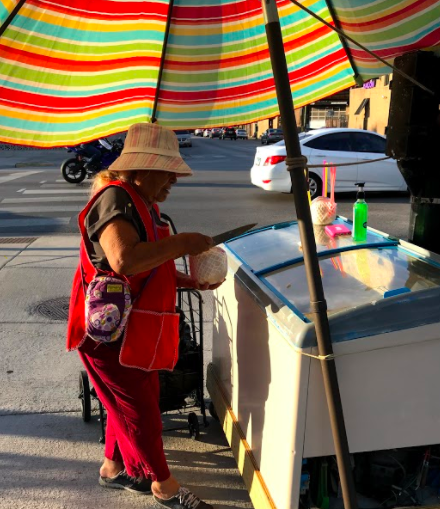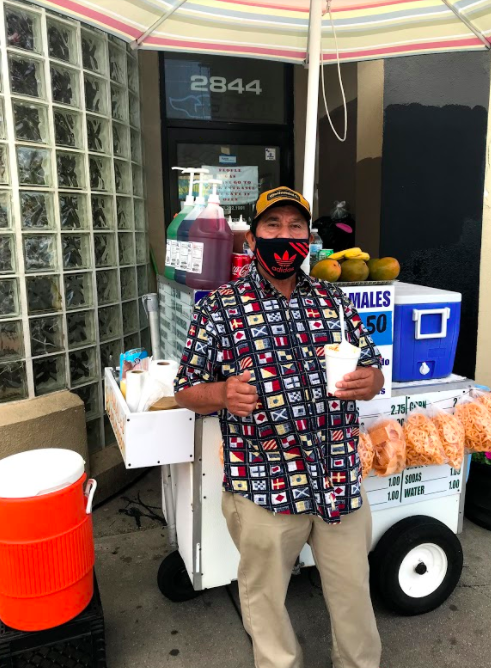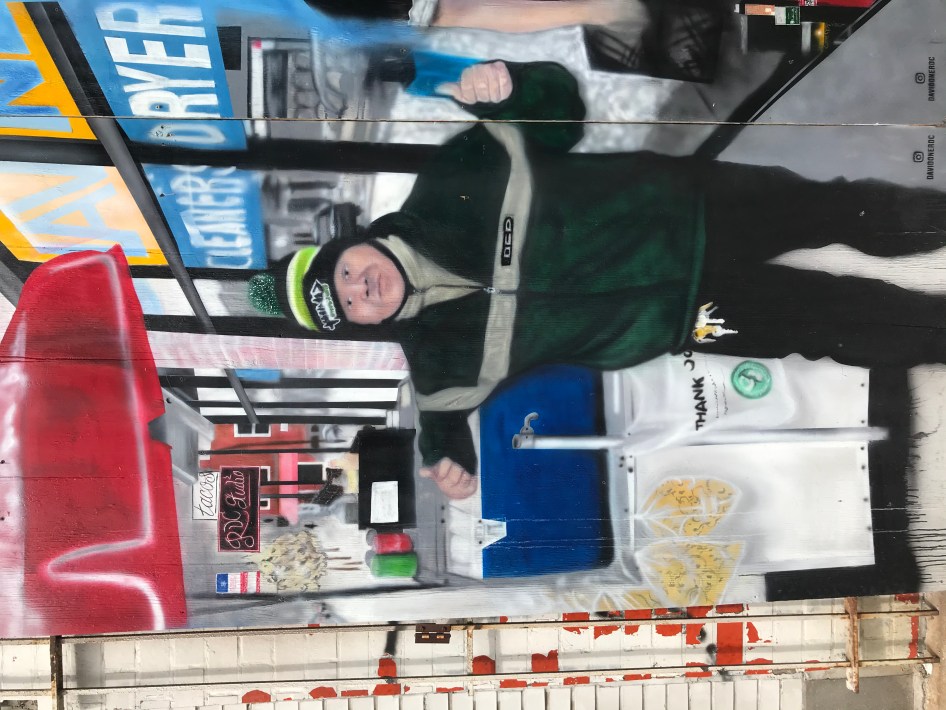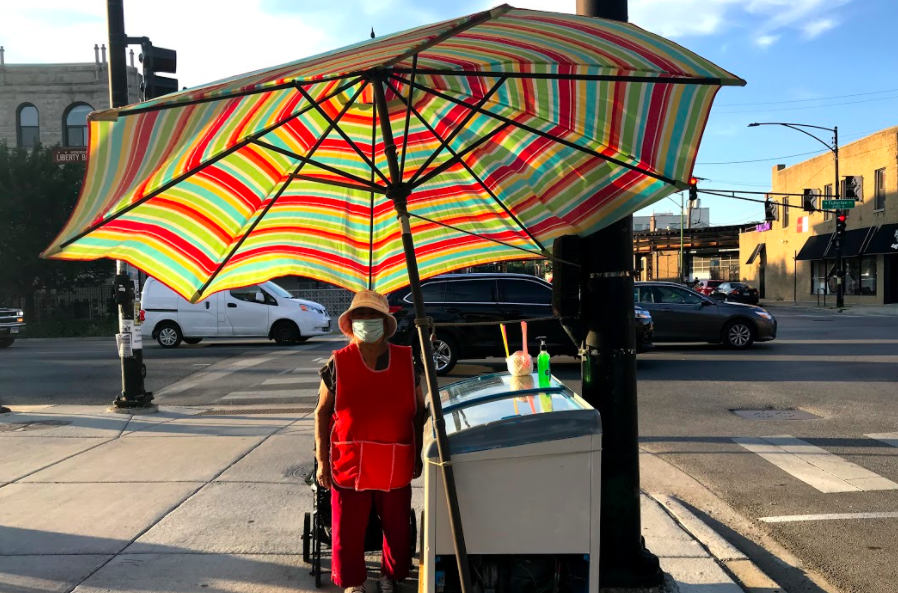After about two months of no work due to the city’s regulations on street vendors amid the pandemic, Logan Square resident Caritina E. is happy to get back outside. The longtime street vendor, who sells sorbet ice cream cups and fresh coconuts, sits at her usual spot at Fullerton and Sacramento Avenues hoping to make up for lost time now that summer is in full swing.
“It is hard for rent, for food, for everything,” Cartina said in Spanish. Originally from Oaxaca, Mexico, she has been selling cold desserts as her only job since she moved to Chicago over 15 years ago.
The pandemic, coupled with recent protests and one weekend of riots after the murder of George Floyd, initially made her feel unsafe to sell on the streets. But now that more businesses are opening with restrictions and people have adjusted to COVID-19 precautions, she feels more comfortable and has been outside since the middle of July.
Street vendors all over the city and country have felt the economic pains of the pandemic and have turned to community support, relief programs, churches and friends to stay afloat. And as longtime dwellers of public spaces and street corners, vendors are essential to restarting the local economy, creating safe outdoor spaces and prolonging cultural neighborhood heritage.
With more people eager to be outside during summer, vendors like Caritina have a chance to make up money that she lost. She’s seen anywhere from 10 to 20 people per day. “I have to take advantage of the little time I can be out here,” she said. “I don’t sell a lot because people don’t know I am here again.”
Caritina is out almost every day from 2 p.m. to 7 p.m. and said she is grateful to be at a corner that sees ample traffic and is close to her house. While she said she feels safe at the busy intersection, she’s witnessed reckless driving and biking and wants to remind people to be more careful of pedestrians on the corner. When I went to visit her on a hot Wednesday July afternoon, I saw three almost-accidents in a span of half an hour. She said it’s gotten particularly worse since the start of the pandemic.
In addition to safety issues, street vendors here and across the country have dealt with racial attacks and harassment, stolen carts and street-vendor city laws that make it hard for them to do their jobs. Caritina said that while nothing bad has happened to her, she wishes the police would make more of an effort to protect street vendors and pedestrians from people wanting to harm them, or reckless drivers and bikers coming too close to the curb. “We [street vendors] have to be very careful because of the pandemic and for our safety,” she said.

Caritina is practicing all the COVID-19 precautions but said the community needs to play their part as well: she wants everyone walking by to wear masks and support people like her to boost the local economy.
Tomas Hernandez, better known in the Avondale community as Jimmy, has run his tamale and elotes stand called Jimmy’s Tamales for over 10 years in the neighborhood. Before the pandemic, he would get about 120 customers a day and easily make over $130 dollars per day, enough to make rent, pay his bills and support his family. Now, he said the pandemic has thrown a wrench in his livelihood and he is down to about 60 customers on a good day.
Like Caritina, he is blessed that his street space is crowded and has easy transportation access so costumers can easily find him. His signature spot is on Milwaukee Avenue by the now-closed Spin Cycle (right underneath a street banner with an image of him and his cart) and when it’s hot, he’s across the street in the shade at 2844 N. Milwaukee Ave. He said he keeps his cart clean every day, which makes the street safer and more inviting to passersby. He is staying very careful while working and makes sure to wear gloves and wear a mask when serving people.

Originally from El Salvador, Hernandez has lived in Avondale for 15 years and is part of the community fabric. Hernandez is in a new mural painted on a nearby vacant building that used to be home to a local grocery store. The work, called the Blue Goose Mural, pays homage to the vibrant immigrant community that built Avondale.

The elotero said he’s grateful to be part of the mural and since it was unveiled June 24, more people have stopped by to support him. The Milwaukee Avenue Alliance started a GoFundMe for Hernandez during the pandemic and gifted him with $1400 a few months ago. But now, Hernandez needs more money to pay for a cavity filling that will cost him about $125 — money he said he doesn’t have right now.
“The community has really helped me because with these ugly times, I’m not selling a lot. People have given me money and food but now I have no more money — I used it [for rent and utility bills],” he said in Spanish.
He said street vendors can help boost the local economy and in turn support other businesses but only if residents do their part and remember to support them. “Everyone needs to do their part in the community to keep moving financially,” he said. “Every person has to help. Doing it alone won’t work but with everyone, yes.”
John Rennie Short, a professor in the School of Public Policy at the University of Maryland, Baltimore County, views street vending as a great way for cities to restart after COVID-19 shutdowns. In a republished guest post on Streetsblog USA, Short advocated for why street vendors belong out on the streets.
“[Street vending] enlivens urban public spaces and increases public safety by making streets vibrant and welcoming,” Short wrote. “Promoting street vending can generate employment, keep people safe and create the vitality and comity that is the hallmark of livable humane cities.”
Short argues that street vending allows for easier social distance than shopping malls and indoor dining areas and are already in line with cities reconfiguring and reimagining public spaces through steps such as widening sidewalks, creating Slow Streets and cafe-only streets.
Local youth justice organization Increase the Peace is providing $500 grants to street vendors during the pandemic and is asking the public to donate to the cause. Hernandez applied for the second wave of grants, which should be delivered sometime in August, per the Increase the Peace’s Facebook page. Vendors can apply for the grant here.
“Street vendors have been some of the people most impacted by this pandemic. Most of them did not receive a stimulus check, don't qualify for business relief, and have lost most of their revenue with the Stay at Home Order,” the organization wrote. “It's more important than ever that we support the essential workers that are the cornerstone of our neighborhoods' cultural heritage.”
You can follow Ariel at ArielParrella on Twitter.




